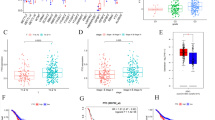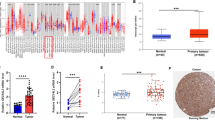Abstract
Objective
This study was conducted to explore the prognostic value of the methylation status of the ASC/TMS1 (apoptosis-associated speck-like protein containing a CARD/the target of methylation-induced silencing-1) promoter in gastric cancer (GC).
Methods
ASC/TMS1 expression was detected in GC tissues and normal gastric mucosal tissues by real-time quantitative PCR and Western blot analysis. Methylation-specific PCR (MSP) analysis was performed to detect the methylated degrees of the DNA of the ASC/TMS1 promoter of 200 GC patients. Associations between molecular, clinicopathological characteristics and survival data were analyzed.
Results
The mRNA and protein expression levels of ASC/TMS1 in GC tissues were lower than those in normal gastric mucosal tissues. With the MSP detection, ASC/TMS1 promoter methylation was found in 68 (34 %) in 200 GC tissues, while none of 40 normal gastric mucosal tissues were found to be methylated. The size of primary tumor and lymph node metastasis were identified as independent relative factors of methylation status of the ASC/TMS1 promoter in GC tissues. Multivariate analysis results demonstrated that the degree of differentiation, serosal invasion, lymph node metastasis and methylated status of ASC/TMS1 promoter were independent prognostic indicators of GC. Lymph node metastasis and methylated status of ASC/TMS1 promoter were optimal prognostic predictors of GC patients, as identified by Cox regression with Akaike information criterion value calculation.
Conclusions
The methylated status of ASC/TMS1 promoter had the potential applicability for clinical evaluation the prognosis of GC.




Similar content being viewed by others
References
Jemal A, Siegel R, Ward E, Hao Y, Xu J, Thun MJ. Cancer statistics, 2009. CA Cancer J Clin. 2009;59:225–49.
Yang L. Incidence and mortality of gastric cancer in China. World J Gastroenterol. 2006;12:17–20.
Deng J, Liang H, Ying G, Zhang R, Wang B, Yu J, et al. Methylation of CpG sites in RNF180 DNA promoter prediction poor survival of gastric cancer. Oncotarget. 2014;5:3173–83.
Laird PW, Jaenisch R. The role of DNA methylation in cancer genetic and epigenetics. Annu Rev Genet. 1996;30:441–64.
Masumoto J, Taniguchi S, Ayukawa K, Sarvotham H, Kishino T, Niikawa N, et al. ASC, a novel 22-kDa protein, aggregates during apoptosis of human promyelocytic leukemia HL-60 cells. J Biol Chem. 1999;274:33835–8.
McConnell BB, Vertino PM. TMS1/ASC: the cancer connection. Apoptosis. 2004;9(1):5–18.
Conway KE, McConnell BB, Bowring CE, Donald CD, Warren ST. Vertino PM TMS1, a novel proapoptotic caspase recruitment domain protein, is a target of methylation-induced gene silencing in human breast cancers. Cancer Res. 2000;60:6236–42.
Virmani A, Rathi A, Sugio K, Sathyanarayana UG, Toyooka S, Kischel FC, et al. Aberrant methylation of TMS1 in small cell, non small cell lung cancer and breast cancer. Int J Cancer. 2003;106:198–204.
Collard RL, Harya NS, Monzon FA, Maier CE, O’Keefe DS. Methylation of the ASC gene promoter is associated with aggressive prostate cancer. Prostate. 2006;66:687–95.
Grau E, Martinez F, Orellana C, Canete A, Yanez Y, Oltra S, et al. Hypermethylation of apoptotic genes as independent prognostic factor in neuroblastoma disease. Mol Carcinog. 2001;50:153–62.
Stone AR, Bobo W, Brat DJ, Devi NS, Van Meir EG, Vertino PM. Aberrant methylation and down-regulation of TMS1/ASC in human glioblastoma. Am J Pathol. 2004;165:1151–61.
Deng J, Liang H, Zhang R, Dong Q, Hou Y, Yu J, et al. Applicability of the methylated CpG sites of paired box 5 (PAX5) promoter for prediction the prognosis of gastric cancer. Oncotarget. 2014;5:7420–30.
Hengartner MO. The biochemistry of apoptosis. Nature. 2000;6805:770–6.
Liu W, Luo Y, Dunn JH, Norris DA, Dinarello CA, Fujita M. Dual role of apoptosis-associated speck-like protein containing a CARD (ASC) in tumorigenesis of human melanoma. J Invest Dermatol. 2013;133:518–27.
Hasegawa M, Kawase K, Inohara N, Imamura R, Yeh WC, Kinoshita T, et al. Mechanism of ASC-mediated apoptosis: biddependent apoptosis in type II cells. Oncogene. 2007;26:1748–56.
Masumoto J, Dowds TA, Schaner P, Chen FF, Ogura Y, Li M, et al. ASC is an activating adaptor for NF-κB and caspase-8-dependent apoptosis. Biochem Biophys Res Commun. 2003;303:69–73.
Stimson KM, Vertino PM. Methylation-mediated silencing of TMS1/ASC is accompanied by histone hypoacetylation and CpG island-localized changes in chromatin architecture. J Biol Chem. 2002;277:4951–8.
Kato K, Iida S, Uetake H, Takagi Y, Yamashita T, Inokuchi M, et al. Methylated TMS1 and DAPK genes predict prognosis and response to chemotherapy in gastric cancer. Int J Cancer. 2008;122:603–8.
Moriai R, Tsuji N, Kobayashi D, Yagihashi A, Namiki Y, Takahashi H, et al. A proapoptotic caspase recruitment domain protein gene, TMS1, is hypermethylated in human breast and gastric cancers. Anticancer Res. 2002;22:4163–8.
Machida EO, Brock MV, Hooker CM, Nakayama J, Ishida A, Amano J, et al. Hypermethylation of ASC/TMS1 is a sputum marker for late-stage lung cancer. Cancer Res. 2006;66:6210–8.
Zhang Z, Tan S, Zhang L. Prognostic value of apoptosis-associated speck-like protein containing a CARD gene promoter methylation in resectable non-small-cell lung cancer. Clin Lung Cancer. 2006;8:62–5.
Terasawa K, Sagae S, Toyota M, Tsukada K, Ogi K, Satoh A, et al. Epigenetic inactivation of TMS1/ASC in ovarian cancer. Clin Cancer Res. 2004;10:2000–6.
Acknowledgments
This work was supported by the National Basic Research Program of China (973 Program 2010CB529301).
Author information
Authors and Affiliations
Corresponding author
Ethics declarations
Conflict of interest
None.
Informed consent
Informed consent was obtained from all individual participants included in the study.
Ethical approval
“All procedures performed in studies involving human participants were in accordance with the ethical standards of the Ethics Committee of Tianjin Medical University and with the 1964 Helsinki Declaration and its later amendments or comparable ethical standards.”
Additional information
C. Zhang is the joint first author.
Rights and permissions
About this article
Cite this article
Wu, L., Zhang, C., Wang, X. et al. Methylation of ASC/TMS1 promoter is associated with poor prognosis of patients with gastric cancer. Clin Transl Oncol 18, 296–303 (2016). https://doi.org/10.1007/s12094-015-1367-y
Received:
Accepted:
Published:
Issue Date:
DOI: https://doi.org/10.1007/s12094-015-1367-y




